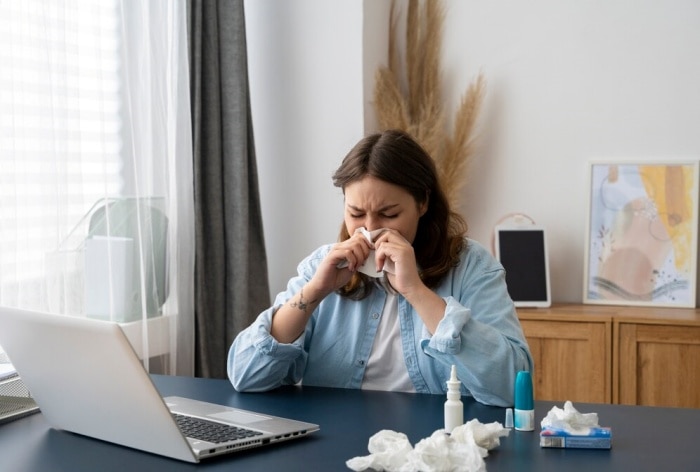Respiratory illness is on a rise in India. With fresh Covid JN.1 cases, here is why all these ailments are growing simultaneously.
DOCTOR VERIFIED
Covid, H1N1, flu, virus, etc are rapidly rising in the Indian subcontinent. During winter season, respiratory problems usually increase making it challenging for people living with asthma, bronchitis and elderly people too. However, recently, more such cases have been reported in hospitals. In the wake of the new Covid Omicron sub-variant JN.1, which is responsible, for driving the surge across the globe, questions are looming about another Covid wave, why cases rise in winters etc. To better comprehend the situation, India.com got in touch with experts.
Why are Covid Cases, flu, H1N1 Rising in India Simultaneously?
Speaking exclusively with India.com, Dr. D S Sowjanya, Senior Pulmonologist, Kamineni Hospitals, Hyderabad, said that respiratory viruses such as Covid-19, flu, and H1N1 typically exhibit seasonal patterns, flourishing in the cool and dry conditions associated with winter. Transmission becomes more prevalent in these colder climates, especially as people spend extended periods indoors in close proximity.
Why are More People Falling Sick In Winters?
He further explained that this situation amplifies the rapid spread of respiratory viruses, fostering an environment conducive to infections. It’s not unusual for various respiratory viruses to circulate simultaneously during specific seasons, leading to a collective increase in cases. Being alert and embracing preventive measures becomes crucial during these times to reduce the risk of infection.
According to Dr. Dinesh V Kamath, Consultant – Internal Medicine, Manipal Hospital, Malleshwaram, Bangalore, recently, we have observed an increase in cases of H1N1, flu, and COVID infections. This rise in viral infections is common during winter, and this year, it has been exacerbated by long year-end vacations, Christmas and New Year, and also the long weekend during Makara Sankranti. The spread of these viral infections is largely associated with people going out shopping and gathering in common areas.
Why do Covid cases rise during winter?
There are several factors contributing to the seasonal pattern of increased Covid-19 cases during winter:
- People tend to spend more time indoors during cold weather, increasing the likelihood of virus transmission in crowded spaces.
- The virus may survive longer in dry air, which is more prevalent during winter.
- Cold weather may weaken the immune response, making individuals more susceptible to infections.
- Some studies suggest that the lipid envelope of the virus may be more stable in colder temperatures.
Precautions to Stay Safe
Ensuring readiness is paramount in handling public health crises. Health authorities must vigilantly track trends, enforce preventive measures, and guarantee that healthcare systems are well-equipped to manage potential spikes in cases. Conducting vaccination campaigns, promoting public health awareness, and encouraging the strict adherence to preventive measures like wearing masks and maintaining good hygiene are crucial steps in alleviating the impact of virus spread. In navigating these challenges, a collective and informed effort from the community is essential to safeguard public health.
Dr. Kamath elaborated that individuals who may have these viral infections can experience symptoms such as fever, cold, cough, or throat pain that rapidly worsen within a day or two. If symptoms deteriorate, they must consult a doctor promptly. It is recommended that they isolate themselves for 3 to 5 days, depending on the severity of symptoms, to prevent further transmission.
–>
